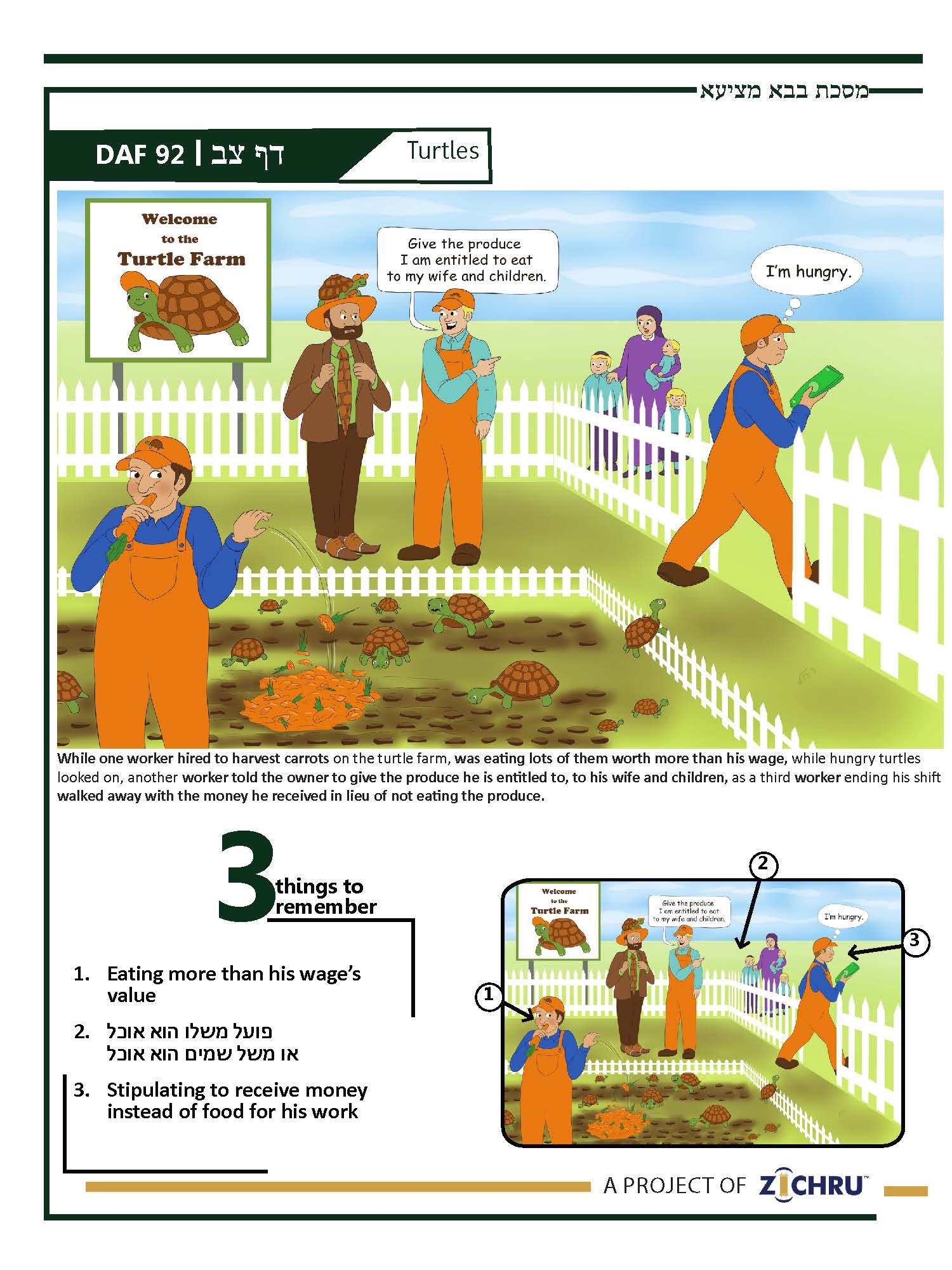Bava Metzia - Daf 92
- Audio Timestamps
0:00 - The 3 Sugyos
2:43 - Review of 3 Sugyos
5:13 - Siman
7:51 - 4 Blatt Back Chazarah
14:58 - Pop Quiz (Last 7 blatt)
For access to all Zichru resources including PDFs, and illustrations CLICK HERE
- Eating more than his wage’s value, eating the first and only grape cluster picked
The next Mishnah states: אוכל פועל קישות אפילו בדינר – A worker may eat a cucumber, even if worth a dinar, כותבת ואפילו בדינר – or eat a date, even if worth a dinar, and is worth more than his entire wages. Rebbe Elazar Chisma says a worker cannot eat more than his pay. The Chochomim permit it, but we teach him not to be a glutton, which will discourage people from hiring him. The Gemara asks that the Chochomim seem to hold the same position as the Tanna Kamma, and first explains that they disagree if we advise him against gluttony. Alternatively, they argue about Rav Assi’s ruling: אפילו לא שכרו אלא לבצור אשכול אחד אוכלו – even if he only hired him to pick a single grape-cluster, he may eat it. The Tanna Kamma subscribes to this view, and means to allow eating the only cucumber or date he was hired to harvest. In a third explanation, they argue about another ruling of Rav Assi, that even if a worker only picked a single grape-cluster, he may eat it. The Gemara proceeds to explain the novelty of each of Rav Assi’s two rulings.
- פועל משלו הוא אוכל או משל שמים הוא אוכל
The Gemara asks: פועל משלו הוא אוכל – Does a worker eat his own food, או משל שמים הוא אוכל – or does he eat Heaven’s food? That is, do we consider the worker’s entitlement to food an addition to his wages, and they belong to him, or are they a charitable gift, similar to those given to the poor from one’s field? A practical difference emerges where the worker says: תנו לאשתי ובני – “Give the produce I am entitled to eat to my wife and children.” If his right to eat is משלו, he may give it to whomever he pleases, but if he only eats משל שמים, he cannot: לדידי' זכי ליה רחמנא – to him, Hashem granted the right to eat; לאשתו ובניו לא זכי להו רחמנא – to his wife and children, Hashem did not grant such a right.
Numerous proofs are brought to resolve this question.
- Stipulating to receive money instead of food for his work, or his children’s or slaves’ work
A proof is suggested from the Mishnah on the next Daf: קוצץ אדם על ידי עצמו – [a worker] may stipulate for himself to receive money instead of his right to eat produce. He may do the same for his adult children, his wife, or his adult slaves, when they work for others, מפני שיש בהן דעת – because they have intelligence, and agree to waive their right to the produce. However, one cannot stipulate for his minor children, nor for his minor slaves, because they lack intelligence to waive their right to produce. The Gemara assumes the case is במעלה להן מזונות – where he provides them with sustenance, and is therefore entitled to their wages. Still, he cannot stipulate for minors, which proves that the right to eat produce is משל שמים, and outside his jurisdiction!? Although the Gemara deflects the proof, it then quotes a Baraisa taught by Rebbe Hoshaya, which teaches one can stipulate for his minor slaves. After a lengthy discussion, the Gemara concludes that this issue is the point of contention: the Baraisa holds one’s right to produce is משלו, so the owner can stipulate to receive compensation for it, and the Mishnah holds this right is משל שמים.
Siman – Turtles
While one worker hired to harvest carrots on the turtle farm, was eating lots of them worth more than his wage, while hungry turtles looked on, another worker told the owner to give the produce he is entitled to, to his wife and children, as a third worker ending his shift walked away with the money he received in lieu of not eating the produce.


